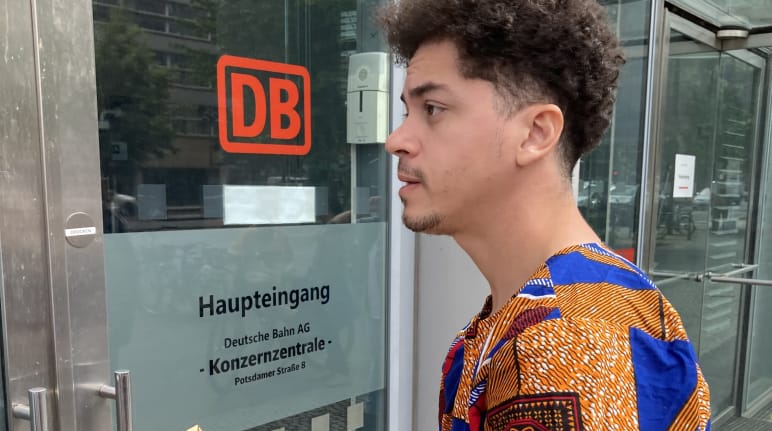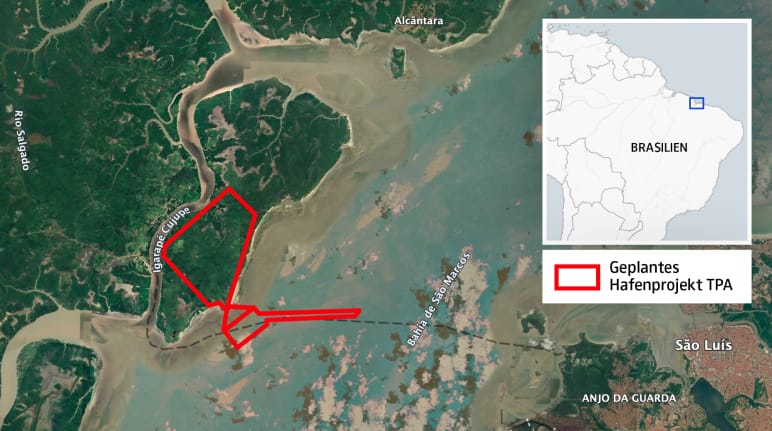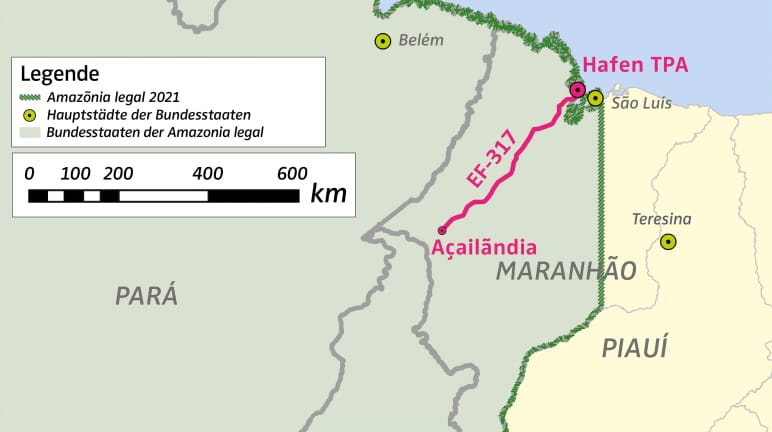Brazil: Keep Deutsche Bahn out of Amazonia!
A destructive rail and port project is taking shape in the Amazon region of Brazil. Germany’s national railway, Deutsche Bahn (DB), is involved. If realized, millions of tons of soy and iron ore will be exported to China, Europe and the USA. The people of Brazil, the rainforest and the coastal mangroves will suffer.
News and updates Call to actionTo: Chairman of the Deutsche Bahn Management Board and CEO, Dr. Richard Lutz; Deutsche Bahn and its subsidiaries
“Deutsche Bahn must not participate in the GPM rail and port project in the Amazon rainforest of Brazil.”
GPM, a project being developed by Portuguese businessmen, wants to clear and develop large parts of the island of Cajual in northeastern Brazil for the Alcântara Port Terminal (TPA), a private industrial and port complex – in the very area that is home to traditional communities of the Quilombola, the descendants of formerly enslaved people from Africa.
Along with the port, a 520-kilometer private freight railway, the EF-317, would reach deep into the Amazon region. It would cut through numerous traditional communities, and six Indigenous territories are located nearby.
Germany’s national railway, Deutsche Bahn (DB), is involved in the project. Its subsidiary, DB E.C.O. Group, has signed a memorandum of understanding with GPM to jointly develop and operate the railway.
For eight years, the project has been taking shape without informing the public or respecting the rights of Indigenous peoples and Quilombolas to consultation and free, prior and informed consent, as required by UN Convention ILO 169, signed by Brazil and Germany. No studies have been made of the project’s impact on the population and the environment.
The project would be located in two protected areas on the Atlantic coast, which feature the largest contiguous and intact mangrove belt in the world. The island of Cajual is home to a breeding colony of 2,500 scarlet ibises and wintering area for migratory birds from North America.
In addition, the railway would run through the middle of the “Belém Endemic Area”, the region of the Amazon basin most threatened by deforestation.
The project would leave the region wide open for explotation and the export of commodities like soy, iron ore, copper, fracked gas and hydrogen.
Please sign our petition and tell Deutsche Bahn to withdraw from the Amazon project immediately.
Start of petition: 01/08/2024
BackgroundOn May 31, 2024, Rainforest Rescue, together with our Brazilian partner organization Justiça nos Trilhos, the Chile-Latin America Research and Documentation Center (FDCL), Kooperation Brasilien (Kobra) and Misereor, held a demonstration in front of the DB headquarters at Potsdamer Platz in Berlin and filed a complaint against the involvement of the DB subsidiary DB E.C.O. Group in the GPM project.
According to the participating organizations, GPM’s actions violate the International Labour Organization’s (ILO) Convention No. 169 on Indigenous Peoples, which has been ratified by the German government, as well as the German Supply Chain Act, which imposes special due diligence obligations on German companies. The GPM project also threatens the Amazon rainforest, the protection and conservation of which is an important goal of German development, environmental and climate policies. We therefore call on DB to withdraw from the project immediately.
DB’s response
DB’s complaints office has initiated the review process, but the outcome is uncertain. DB’s Chairman of the Management Board and CEO, Dr. Richard Lutz, wrote to us that respect for internationally recognized human rights and fundamental freedoms is an important principle for DB, that the company takes our concerns very seriously, and that “several additional requirements must be met before DB will consider participating in the project.”
Meanwhile, managers from DB’s subsidiaries, together with GPM’s project operators, are attending meetings with Brazilian ministers, government officials and members of parliament to move the project forward. GPM is also using the DB name prominently to give the GPM project an air of seriousness and competence.
In a GPM corporate video, the Amazon rainforest has been shifted to the west to give the impression that the planned Alcântara port terminal and the route for the EF-317 freight railway are outside the Amazon region. The video also make the astonishing claim that Brazilian agricultural production can increase by 180% in the next ten years “without cutting any trees”.
But the video and the information provided by the project’s promoters are misleading: The Amazon region is officially defined in Brazil as the “Legal Amazon” (Amazônia legal). Both the port and the entire rail line are clearly within the legal Amazon, as our map with data from the Brazilian Institute of Geography and Statistics (IBGE) shows. According to a recent study, agriculture, especially soy, is the main driver of deforestation in Brazil: Government figures state that 9,064 square kilometers – an area 3.5 times the size of Greater London or more than 11 times the size of New York City – were cleared in 2023 alone.
To: Chairman of the Deutsche Bahn Management Board and CEO, Dr. Richard Lutz; Deutsche Bahn and its subsidiaries
Dear Dr. Lutz, Ladies and Gentlemen,
Environmental, human rights, Indigenous and Quilombola organizations from the Brazilian state of Maranhão are warning of the negative impacts of the planned construction of a 520-kilometer freight railway in the Amazon region, as well as the planned construction of an industrial zone and export port on the Atlantic coast.
The organizations oppose the Grão-Pará Maranhão (GPM) project because its planning does not respect fundamental principles such as the right of Indigenous peoples, Quilombolas and traditional communities to consultation and free, prior and informed consent. This is exactly what the UN Convention ILO 169, signed by Brazil and Germany, requires. Furthermore, the impact of the project on the population and the environment has not been studied.
Deutsche Bahn’s subsidiary, DB E.C.O. Group, has signed a memorandum of understanding with GPM for the joint project development and subsequent operation of the railway. Organizations in Brazil and Germany are calling on Deutsche Bahn and its subsidiary to drop the project.
If realized, the rail and port project will transport many millions of tons of agricultural and mining commodities, such as soy and iron ore, from the Amazon rainforest and the Cerrado savannah every year. The impact on traditional communities and the rainforest would be devastating.
Yours faithfully,
The issue – our appetite for meat
Most people in rich countries consider meat to be essential to a good meal. That holds especially true for Americans, who each consumed 90 kilograms of meat in 2014 – in the same year, the global average was 34 kilograms. There are 19 billion chickens, 1.4 billion cows, 1 billion pigs and 1 billion sheep on the planet at any given time – that’s three head of livestock for every person.
Maintaining such a huge livestock population has a very high price: 26 percent of the world’s ice-free land is used for livestock grazing and 33 percent of the world’s cropland is dedicated to growing livestock feed. Instead of feeding humans, a significant share of the world’s wheat, corn, barley and soybeans is thus used to raise livestock. Soybean meal is the largest source of protein animal feed in the world, and the areas needed for its production are expanding into fragile ecosystems such as the Brazilian Cerrado and the Amazon.
The impact – deforestation, monocultures, climate change
Landscapes once covered by rainforest and savannah are now marked by endless industrial agriculture spaces. More than 75 million hectares are devoted to growing soy – an area three times the size of the United Kingdom. Indigenous people are frequently displaced when their forests are bulldozed or torched, and those that remain are often in grave danger due to pesticide exposure: Roundup-Ready Monsanto GMO soybean plants are grown on 31 to 38 percent of the total planted area in Brazil, Argentina, Paraguay and Uruguay. The active ingredient in Roundup is glyphosate, an herbicide that is suspected of causing cancer and damaging human DNA.
Producing meat has a profound impact on the climate: with methane from bovine stomachs, carbon released by deforestation and fossil-fueled machinery, and nitrous oxide released by synthetic fertilizer, animal agriculture accounts for 18 percent of the world’s greenhouse gas emissions.
The solution – plant power and planned indulgences
Our food choices have a direct impact on the future of the rainforests: the animal products we eat account for 72 percent of all food-related greenhouse gas emissions. Their production also requires many times more farmland than plant products for human consumption.
Here is how you can help protect your health, the environment and the climate:
- Eat alternatives to meat and dairy products: Seitan steaks, lupin spreads, soy milk and other tasty and nutritious alternatives to animal products can be found in virtually any supermarket.
- If you must eat meat, make it an occasional treat: If you are not ready to give up meat entirely, reduce your consumption as much as possible and make meat a planned indulgence. Choosing organic meat can help further reduce the environmental impact of your diet.
- Say yes to soy products: Only about two percent of the world's soy crop is processed into tofu, soy yogurt and similar products. Soy for human consumption is mostly grown in Europe and does not drive deforestation.
- Stop food waste: Consumers in North America and Europe each waste between 95 and 110 kg of food a year – much of it meat. Planning your grocery shopping with care can literally save lives.
- Speak out: Tens of thousands have taken part in street protests such as the March Against Monsanto to pressure policymakers and advocate forms of agriculture that take human health, animal welfare and climate protection into account. Taking part in online petitions and writing to your elected representatives can also make a real difference.
Deutsche Bahn pulls out of proposed rail and port project in Amazonia

For the past year, Rainforest Rescue and partner organizations have worked hard to make Deutsche Bahn (DB) aware of the potentially disastrous consequences of a planned rail-and-port project in Brazil – with success: DB has now informed us that it no longer intends to participate in the GPM infrastructure project in the Amazon rainforest.
No EU money for GPM rail and port project in Brazil!
Together with our partner organizations from Brazil, we were in Brussels at the end of November to stop EU funding for a planned rail and port project in the Amazon rainforest in Brazil – with success! Our letter and visit were key to the European Commission’s decision not to fund the project.
Deutsche Bahn conceals its involvement in Amazon rainforest rail and port project
Germany’s national railway company Deutsche Bahn (DB) carefully cultivates a public image of environmental and social responsibility. However, its possible involvement in a destructive private infrastructure project in Brazil’s Amazon rainforest suggests a stark contrast – and it appears DB may be trying to obscure the truth about its participation.
GPMGrão-Pará Maranhão (GPM): https://graoparamaranhao.com/en/
numerous traditional communities
Directly affected are two Quilombo communities, Alcântara and Tanque de Valenca, as well as 16 agrarian reform settlements and 22 communities:
- Alcântara; 2. Bequimão; 3. Peri Mirim; 4. Palmeirândia; 5. São Bento; 6. São Vicente Ferrer; 7. Olinda Nova do Maranhão; 8. Matinha; 9. Viana; 10. Pedro do Rosário; 11. Penalva; 12. Monção; 13. Zé Doca; 14. Governador Newton Bello; 15. Alto Alegre do Pindaré; 16. Santa Luzia; 17. Bom Jardim; 18. Buriticupu; 19. Bom Jesus das Selvas; 20. Amarante do Maranhão; 21. São Francisco do Brejão; 22. Açailândia
Área de Proteção Ambiental (APA) Reentrâncias Maranhenses: https://uc.socioambiental.org/en/arp/782 and
APA Baixada Maranhense: https://uc.socioambiental.org/en/arp/785
Both are also protected under the UN’s international RAMSAR Convention as wetlands of international importance: https://rsis.ramsar.org/ris/640 and https://rsis.ramsar.org/ris/1020
Instituto Chico Méndes, 2018. The Brazilian Mangrove Atlas. Executive Summary: http://www.mangrovealliance.org/wp-content/uploads/2018/05/Brazil-Mangroves-Atlas.pdf and Instituto Chico Méndes, 2018.
ATLAS DOS MANGUEZAIS DO BRASIL: https://ava.icmbio.gov.br/pluginfile.php/4592/mod_data/content/14085/atlas%20dos_manguezais_do_brasil.pdf
Convention No. 169 on Indigenous PeoplesEuropean Parliament, 2021. Menschenrechte – Bundestag ratifiziert Konvention zu Rechten indigener Völker: https://www.bundestag.de/dokumente/textarchiv/2021/kw15-de-rechte-indigener-voelker-830908
Supply Chain ActGerman federal government, 2024. Verantwortung in globalen Lieferketten – Mensch und Umwelt besser geschützt: https://www.bundesregierung.de/breg-de/aktuelles/lieferkettengesetz-1872010
German development, environmental and climate policiesBMZ, 2023. NEUSTART FÜR DEN AMAZONIENFONDS – Entwicklungsministerium gibt 35 Millionen Euro für Regenwaldschutz in Brasilien frei: https://www.bmz.de/de/aktuelles/aktuelle-meldungen/deutschland-gibt-35-millionen-euro-fuer-den-amazonienfonds-frei-135998
Dr. Richard LutzReply from Dr. Richard Lutz, Chairman of the DB Management Board and CEO, dated June 26, 2024: Reply-letter-Dr-Lutz-DB-Board-Chairman-27-6-24.pdf
using the DB name prominentlyGrão-Para Maranhao, 2023. GPM PRESENTS A VENTURE IN PARTNERSHIP WITH DB AND SYSFER: https://graoparamaranhao.com/en/news/gpm-presents-a-venture-in-partnership-with-db-and-sysfer/ and CONSTRUCTIVE MEETING WITH THE MINISTER OF PORTS AND AIRPORTS: https://graoparamaranhao.com/en/news/meeting-minister-of-ports-airports/
GPM corporate videoGPM corporate video in English: https://graoparamaranhao.com/en/news/tpa-ef-317-institutional-video-is-very-well-received-by-the-market/
Carreiora, I. et.al., 2024. The deforestation effects of trade and agricultural productivity in Brazil: https://www.sciencedirect.com/science/article/abs/pii/S0304387823001736
Government figuresMinistério da Ciência, Tecnologia e Inovação, 2024. Desmatamento na Amazonia cai 21.8% em 2023: https://www.gov.br/mcti/pt-br/acompanhe-o-mcti/noticias/2024/05/desmatamento-na-amazonia-cai-21-8 -em-2023
This petition is also available in the following languages:
Help us reach 100,000:














